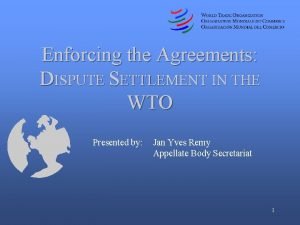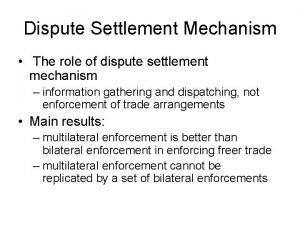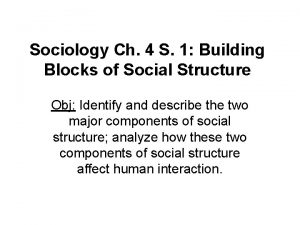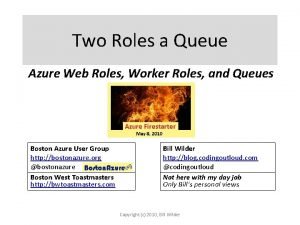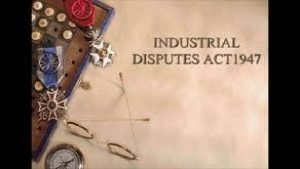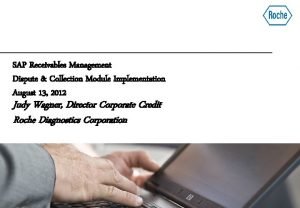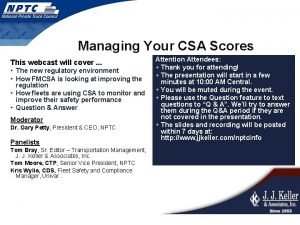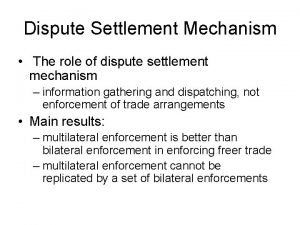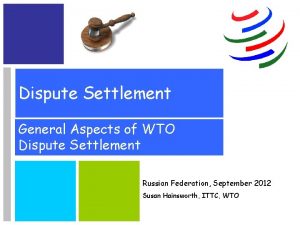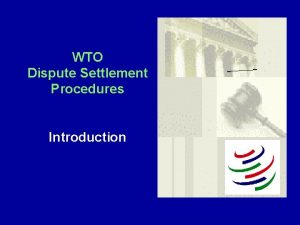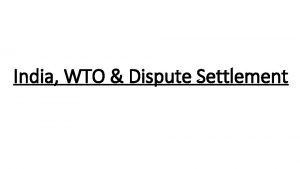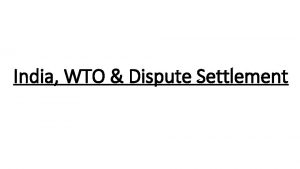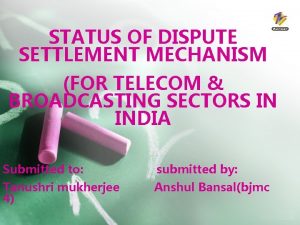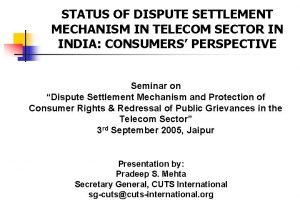Dispute Settlement Mechanism The role of dispute settlement












- Slides: 12

Dispute Settlement Mechanism • The role of dispute settlement mechanism – information gathering and dispatching, not enforcement of trade arrangements • Main results: – multilateral enforcement is better than bilateral enforcement in enforcing freer trade – multilateral enforcement cannot be replicated by a set of bilateral enforcements

Voluntary Participation • Starting point: – Participation in a multilateral agreement is voluntary. – The worse thing a country will face from failing in fulfilling the agreement is losing the privilege of being a member – [Compare with this: you borrow money from a bank using your flat a collateral and you fail to repay— then the bank can take your flat and sell it!] • Design of a multilateral agreement – It should be designed so that member countries want to stay in and abide by it on a voluntary basis

Nash equilibrium • A Nash equilibrium is a profile of strategies (one strategy for each player) so that no player can gain from a unilateral deviation. • In a dynamic setting, we have a more refined concept of subgame perfect equilibrium, which itself is a Nash equilibrium. • We hope that participation and abiding by the rules is a (nash or subgame perfect) equilibrium.

A one shot game between two countries • Assumptions: a one shot game, each country is maximizing its own welfare • Both playing “protection” is a Nash equilibrium. • Each will defeat even if a free trade agreement has been signed. Country B Free trade Country A Protection Free trade 10, 10 3, 15 protection 8, 8 15, 3

Repeated Game • Now change the game, assume that it is played indefinitely • Consider the following strategies – Always choose free trade so long as protection has not been chosen – Always choose protection if protection has been chosen • Clearly, given that both countries abide by these strategies, there will be perpetual free trade. • This is indeed a subgame perfect equilibrium if countries are patient enough, i. e. , if they do not discount future payoffs too much.

Repeated Game • • Common discount factor: 0<σ<1 One dollar arriving next period is worth σ dollars now. If cheating now, it brings the country a gain of 15 -10=5. Next period on, the country suffers a loss of 10 -8=2 each period. • The loss’s present value is which is greater than 5 if σ>5/7. Hence cheating is not worthwhile.

Imbalance Trade Country B Free trade protection Country A 10, 10 3, 15 • In an infinitely repeated scenario, as in a one shot scenario, it is optimal for country B to choose protection. • Country A is unable to punish B! • Imbalance trade between two countries make it difficult to sustain free trade even in a repeated environment

Multilateralism • Consider a world with three countries cars B C apparels A computers

Multilateralism • In a repeated scenario, as in a one shot scenario: – Even if a bilateral free trade agreement has been signed between A and B, B will defeat against A – Even if such one has been signed between B and C, C will defeat against B – Even if such one has been signed between C and A, A will defeat against C

Multilateralism • Think of a multilateral free trading agreement: • Each country adopts free trade so long as protection has not been used • Each country adopts protection so long as protection has been used • The above strategies constitute a subgame perfect equilibrium so long as σ high enough

Multilateralism • Without loss of generality, consider country B. If nobody cheats, B will have a payoff of 10 (from trade with A) and 10 (from trade with C). Hence a total of 20. • If country B cheats now, its current payoff will be 15 (w. r. t A) +10 (w. r. t C). Hence a gain of If you cheat now, you gain 25 -20=5 now. • In the next period, B’s payoff will be 15 (w. r. t. A) + 3 (w. r. t. C) = 18. Hence a loss of 20 -18=2. • If σ>5/7, then the loss exceeds gain because

Multilateralism • Hence, a multilateral agreement is not just a summation of several bilateral agreements. • It achieves something that a bunch of bilateral agreements cannot. • But why are we sure that country C will be aware of country B’s cheating against country A? • We need a dispute settlement mechanism (DSM) to give verdicts to trade dispute raised by complainant countries • The DSM doesn’t need to have enforcement power!
 Wto dispute settlement mechanism
Wto dispute settlement mechanism Dispute settlement mechanism meaning
Dispute settlement mechanism meaning Role making role taking beispiele
Role making role taking beispiele Statuses and their related roles determine the structure
Statuses and their related roles determine the structure C# azure worker role example
C# azure worker role example Objectives of industrial dispute act 1947
Objectives of industrial dispute act 1947 Territorial morphology ap human geography
Territorial morphology ap human geography Financial education services testimonials
Financial education services testimonials Objectives of industrial dispute act 1947
Objectives of industrial dispute act 1947 Sap receivables management
Sap receivables management Maine vs canada war
Maine vs canada war Csa basic thresholds
Csa basic thresholds Msc construction law and dispute resolution
Msc construction law and dispute resolution
